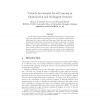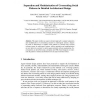419 search results - page 6 / 84 » A Social Approach to Communication in Multiagent Systems |
81
Voted
ER
2004
Springer
15 years 5 months ago
2004
Springer
Social and intentional behaviours appear as two main components of the agent paradigm. Methods of conventional software engineering do not seem to be appropriate to gain a full kno...
115
Voted
GECCO
2008
Springer
15 years 21 days ago
2008
Springer
Social learning is a mechanism that allows individuals to acquire knowledge from others without incurring the costs of acquiring it individually. Individuals that learn socially c...
IAT
2005
IEEE
15 years 5 months ago
2005
IEEE
Choosing when to communicate is a fundamental problem in multi-agent systems. This problem becomes particularly hard when communication is constrained and each agent has different...
87
Voted
CAISE
2006
Springer
15 years 3 months ago
2006
Springer
This paper outlines an aspect-oriented approach to support separation and modularization of crosscutting concerns in multi-agent systems. Aspects as abstractions to capture social ...
101
click to vote
WOA
2003
15 years 29 days ago
2003
— We adopt a form of group communication, called channeled multicast, for active rooms and other scenarios featuring strict real-time requirements, inherently unreliable communic...


